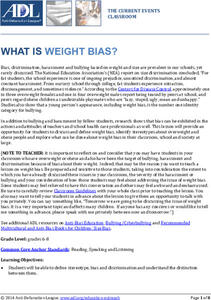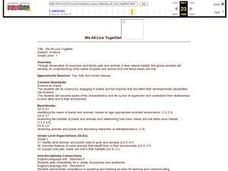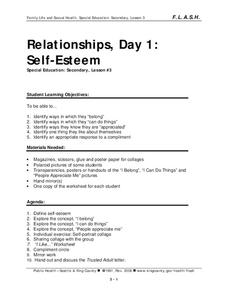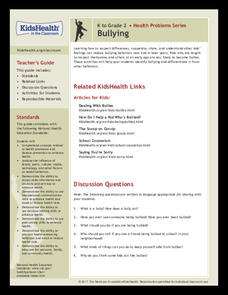Mathematics Vision Project
Similarity and Right Triangle Trigonometry
Starting with similar triangles and dilation factors, this unit quickly and thoroughly progresses into the world of right triangle features and trigonometric relationships. Presented in easy-to-attack modules with copious application...
Health Smart Virginia
Building Self-Esteem and Self-Image
The ninth lesson in the Health Smart series is designed to get high schoolers to understand the factors that make them feel the way they do about themselves, their bodies, and their self-worth. Pupils watch a video about teens and body...
Health Smart Virginia
Making Partners
Partnering with someone new may be daunting. Here a lesson plan encourages young peers to work collaboratively in physical activity settings. Following a whole-class discussion, scholars participate in several cooperative activities that...
Overcoming Obstacles
Using Communication Skills Effectively
Miscommunication is often the basis of conflict. To improve their communication skills, pupils first review what they learned about assertive (as opposed to aggressive or passive) communication, role-play several scenarios, and then...
Anti-Defamation League
What Is Weight Bias?
After setting rules and expectations to create a safe place to share thoughts and feelings, scholars define the terms; stereotype, basis, and discrimination. Using a web brainstorm, learners list words associated with overweight and...
College Board
2008 AP® Statistics Free-Response Questions Form B
To know what is on the test would be great. The six free-response question from the second form of the 2008 AP® Statistics gives pupils an insight into the format and general content of the exam. Each question requires the test taker to...
Missouri Department of Elementary
My Problem…Your Problem…Our Problem
Encourage sixth graders to take responsibility for their actions and become a problem solver. Pupils discuss new problems faced in sixth grade then identify ones that involve other people. A worksheet guides their practice in conflict...
Nemours KidsHealth
Getting Along: Grades 3-5
Two lessons boost social awareness and spread gratitude. In the first lesson, scholars write a newspaper article that describes a conflict and ways to solve it. In the second lesson, pupils offer kindness coupons to family and friends to...
Overcoming Obstacles
Problem Solving on the Job
The truth is there are consequences for actions. The third instructional activity in the "Problem Solving Module" asks class members to brainstorm a list of problems, select one and invent a system, process, or object that might solve...
Curated OER
What Does Respect Look Like at Home?
Fourth graders conceptualize the value of respect for self, and give examples and non-examples. They describe how things could have been done differently within the family or the community for non-examples. Students conceptualize the...
Curated OER
We All Live Together
First graders examine the lifestyle of classroom and family pets in their natural habitat. They determine the needs of plants and animals, and how those needs are met. They listen to read alouds, sing songs, and draw using computer based...
Curated OER
History & Diversity
Students list the qualities needed to build strong family relationships. They gain an appreciation for the sacrifices of their ancestors who came to America and gain insights into the many fine qualities of minority families.
Curated OER
Family Stories
Learners use dance to better understand the writing process. In this interdisciplinary lesson, students use their critical thinking skills to connect dance with writing. Learners use thinking maps to follow the writing process, write a...
Curated OER
Self Assess & Family Relationships
Students examine the health habits that are practiced by adolescents and how it can affect them as they continue through life. In this health habits lesson students complete several activities.
Curated OER
Greek Myths
Ever wonder why the ancient Greeks had myths? The explanation you'll find here, describes myths as stories that explain things people didn't understand. They also tell the stories of the gods people in ancient times believed in. These...
Curated OER
All in the Family: Calculating Cousins
Students view pictures of distant "cousins" to humans. They place them in order by their distance from humans. Students receive a packet of six pages featuring graphics and a cousins summary page. They work in groups to complete 5 cousin...
LABScI
Taxonomy: Who is in My family?
Find similarities in seemingly unlike organisms. The second instructional activity in a series of 12 builds the concept of a taxonomy and explores the use of a dichotomous key. Learners begin in part one by attempting to group a set of...
Curated OER
Relationships, Day 1: Self-Esteem
Expose your secondary special education class to the importance of belonging and feeling accepted. They define self-esteem, pride, and appreciation. Then create a self collage and share what they like about themselves with the class. A...
Curated OER
Relationships, Day 4: Friendships & Dating
It is so important to help special needs individuals know the difference between dating and friendship. They define friendship, differentiate between friends and strangers, role-play, practice greetings, then talk about dating. This...
King Country
Lesson 6: Relationships - Day 4: Friendships & Dating
Class members engage in a series of activities that encourage the development of the social skills associated with dating and sustaining friendships.
King Country
Lesson 4: Relationships - Day 2: Gender Identification
Gender roles and gender identity are the focus of a instructional activity designed for high school special education classes. Read the introduction to the packet carefully, as it contains advice about how to approach the subject with...
EngageNY
Grade 10 ELA Module 2: Unit 2, Lesson 8
How do people's relationships with their parents impact their lives? Scholars read paragraphs 23–26 from "A Genetics of Justice" by Julia Alvarez, in which the author details her relationship with her mother. Pupils discuss how the...
Nemours KidsHealth
Bullying: Grades K-2
Two activities for young scholars explore the concept of bullying. The first activity examines scenarios to point out bullying behavior. The second activity encourages positive peer relationships by identifying kind and respectful...
Virginia Department of Education
Owl Family Natural Selection
How do genetic mutations within a population lead to future variations? Provide your class with the resources to answer this question and more upon completing an activity on natural selection. The entire class participates in a fun role...
Other popular searches
- Grade 3 Family Relationships
- Healthy Family Relationships
- Family Relationships Poetry
- Relationships. Extended Family

























